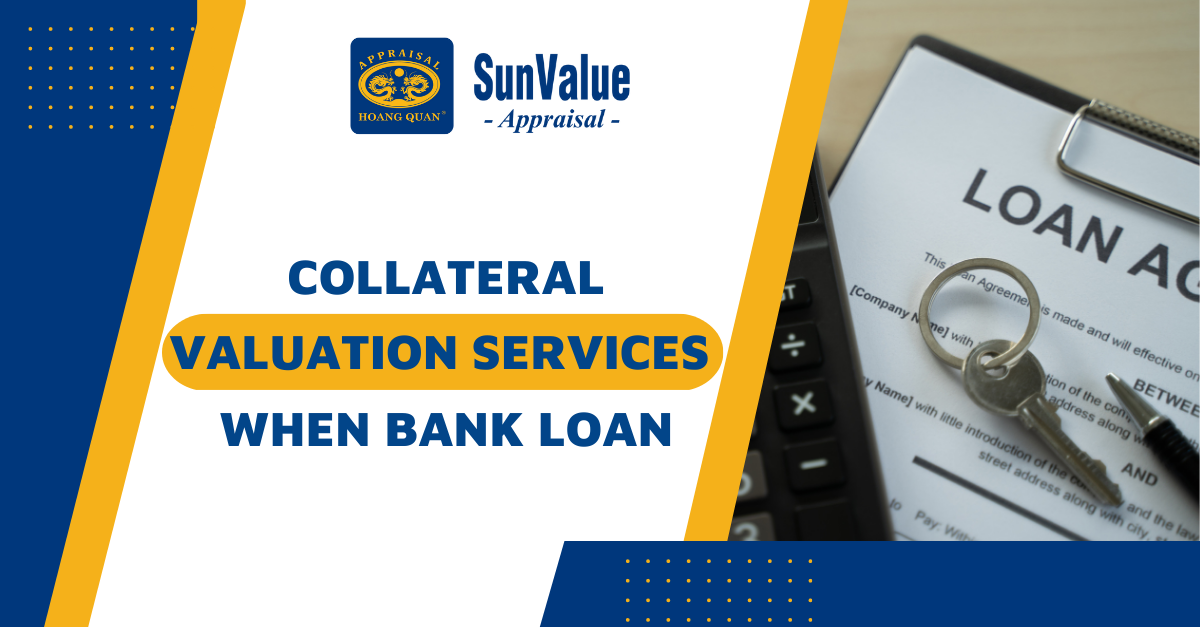COLLATERAl VALUATION SERVICES WHEN BANK LOAN
Currently, many people still do not fully understand the effect and meaning of collateral valuation when borrowing from a bank, although this is a regulation being implemented in most banks. Valuation of collateral is also the first step for the bank to consider whether to accept a loan or not, how much to borrow.

What is collateral?
First of all, we must understand what the term "Security Assets" is?. According to Clause 7, Article 3 of Decree No. 163/2006/ND-CP of the Government issued on December 29, 2006 on secured transactions, it is stated that: “Security property is an asset that the guarantor uses to secure a secured transaction. performance of civil obligations towards the secured party”. Also according to Article 4 of this Decree it is said: "Security assets can be existing assets, assets formed in the future and allowed to be traded".
Existing assets can be easily seen and counted. However, in terms of assets to be formed in the future, it is relatively abstract. Therefore, the state clearly stipulates in Article 2 of Decree 11/2012/ND-CP that the assets formed in the future are explained as follows:
Assets formed in the future include:
- Assets formed from borrowed capital;
- The property is in the formative stage or is being created legally at the time of entering into the security transaction;
- Property has been formed and subject to registration of ownership, but only after the time of entering into a security transaction, such property can be registered in accordance with law. Assets formed in the future do not include land use rights.”
Relationship between collateral and bank loans.
When you apply for a mortgage bank loan, depending on the value of the loan and the purpose of the loan, you can use many different types of collateral. The more valuable the collateral, the more likely it is to secure large loans with high credit limits. In contrast, low collateral assets, prone to price fluctuations, will often find it difficult to bring the desired loan amount of customers.
Why is it important to appraise the collateral when taking out a bank loan?
Although there are many types of collateral for loan purposes, depending on the regulations of each bank, the collateral for the loan will be different and the loan value is also different. In general, the current lending level of banks is 70% of the collateral value. The most common collaterals today include: real estate papers, valuable papers such as stocks or government bonds, cars, savings books, pink or red books of real estate, contracts, etc. life insurance…
The assets are mortgaged to the bank for the purpose of ensuring that the loans are safe and have the ability to recover loans when they are due. Therefore, such collateral must be appraised according to the standards and regulations of the Law on Valuation of Vietnam. From there determine the exact value so that banks or credit institutions have the basis to accept customers loan documents.
Currently, banks often associate with independent and specialized appraisal units to value the collateral assets of customers to ensure the most objectivity and accuracy.
PRESTIGE ASSESSMENT UNIT IN VIETNAM:
Hoang Quan Appraisal (HQA) - SunValue operates with many years of experience in the field of appraisal with an abundant data warehouse, a team of highly qualified and professional appraisal experts, the appraisal process is fast, tight, minimizing the cost of appraisal... Besides, SunValue service will provide customers with information about the value of the business with high reliability for each appraisal purpose, services include:
- Real Estate Appraisal – SunReal (Townhouses, land, factories, ...)
- Movables Appraisal – SunMovables (Machinery and equipment, production lines, means of transport, ...)
- Business appraisal – SunAsset (Purchase, joint venture, equitization, ...)
- Investment Project Valuation – SunInvest
- Resource Assessment – SunResources
Related article
- THINGS YOU NEED TO KNOW WHEN BUYING A SELLING HOUSE
- PRIORITY TO APPLY TECHNOLOGY IN VALUATION
- PREPARATION TO ORGANIZATION OF SHAREHOLDERS GENERAL MEETING NEEDED VALUATION OF ENTERPRISES
- HOW TO DETERMINATE EXACT LAND PRICE AND LATEST APPLICATION CONDITIONS
- Why Banks - Businesses Choose HQA To Appraise Property Prices
- ASSESSMENT OF DEBTS FOR BUYING AND SELLING PURPOSE



 VI
VI